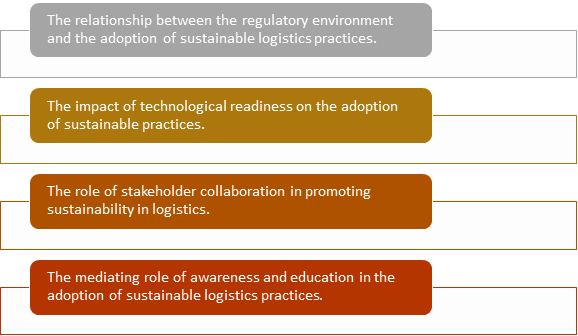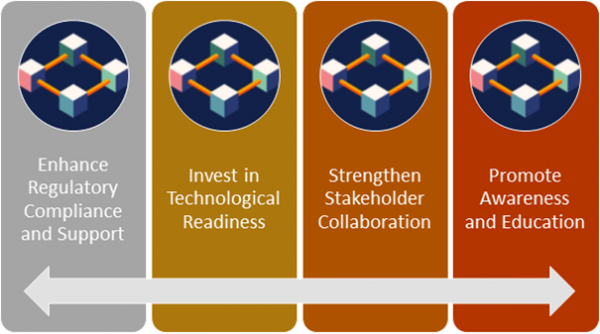How Blockchain Can Transform Logistics For Sustainable Packaging and Resource Optimization

The logistics industry faces a critical challenge: finding the equilibrium between production and delivery times and the reduction of the carbon footprint. Previous models of managing the logistics of fast fashion together with the substantial use of single-use packaging materials present a significant threat to the depletion of resources and the pollution of the environment. Nonetheless, the current technological developments especially the use of blockchain present an excellent solution to these problems. My study focuses on the use of blockchain in enhancing the efficiency of the logistics operation to increase the effectiveness of the visibility process ensure sustainable packaging and minimize resource consumption. This study aims to answer a key question: Can blockchain provide the efficiency required to make sustainable logistics solutions, including better packaging?
The core of this research is the potential of blockchain to solve three main challenges in sustainable logistics:
- Sustainable Packaging.
- Resource Optimization.
- Supply Chain Transparency.

Research Hypotheses focused on four main relationships:
A target of participants was 384 through convenience sampling The data was analyzed to test the hypothesis using correlation analysis.

The findings of this study revealed the following important antecedents regarding sustainable logistics practices and refillable packaging solutions.
Regulatory Environment: Another series of questions was designed to capture the regulatory environment of sustainable logistics practices. The results indicated a positive and strong relationship between the regulatory environment and the extent of sustainable logistics practices. When the regulatory environment for the business is favorable then it is easier for companies to adopt some strategies like refillable packaging as regulations influence the implementation of sustainable strategies.
Technological Readiness: The preparedness of an organization's technological platform also has a strong influence on the successful implementation of sustainable logistics strategies. Companies that have access to blockchain technology and related sources seem to be more prone to sustainability, which may indicate the need for more technological investment.
Stakeholder Collaboration: This study established that the engagement of stakeholders with the provision of logistic practices was a central enabler for sustainable logistics practices. Manufacturing organizations that collaborated with suppliers, customers, and government authorities were in a better place to integrate innovative solutions such as refillable packaging and circular logistics.
Awareness and Education: These variables working as mediators indicate that awareness and education play a role in moderating the inter-dependency between regulatory environment, technological readiness, and stakeholder collaboration. According to the study, education programs and awareness-creating campaigns could also improve the stakeholders’ attitudes toward the adoption of sustainable logistics.
In consequence, the result of this study supports the idea of applying blockchain to make sustainable logistics practices possible. The first key success factor is the regulatory environment which has an impact on the ability of companies to introduce sustainable logistics and refillable packaging into the supply chain. Moreover, awareness and education were revealed as two moderating factors, stressing the role of the stakeholder’s cognition and their activity.
Through the use of blockchain in implementing logistics operations, organizations will develop a sustainable, secure, and environmentally friendly supply chain management system. Because of its features such as recording, validating, as well as authenticating information in real-time, blockchain is said to be convenient for managing sustainability issues within the logistics system.
Based on the research findings, the following recommendations are suggested for stakeholders in the logistics and packaging sectors:
- Enhance Regulatory Compliance and Support: We recommended that logistics firms should commit to environmental laws in order to promote the use of environmentally friendly practices. Since there is a close positive correlation between compliance with regulations and sustainability, it can be more effective to develop partnerships with these regulatory organizations.
- Invest in Technological Readiness: To enhance the firms’ competitive backbone, it is suggested that organizations should focus on IT advancements including blockchain technology. Transparency and traceability are created by the blockchain which is an important factor for resource efficiency and sustainability. It is for this reason that continued training and enhancements to the infrastructure of organizations are important steps in readying those organizations for the application of blockchain.
- Strengthen Stakeholder Collaboration: Suppliers, customers, and government authorities can thus be enlisted in enhancing sustainability at the workplace. Organizations should think about developing partnership programs and signing partnership deals that would help reach goals for mutual sustainable development. The involvement of several parties in sustainable logistics projects using blockchain technology will amplify efforts in the supply chain.
- Promote Awareness and Education: A significant amount of emphasis should be placed on advertising and informative actions to make all interested participants understand the advantages and use of sustainable logistics and refillable packaging. These idea-sharing sessions include workshops, seminars, and training sessions to steer the participants in the right direction on sustainable practices. Education is the most important moderator for encouraging logistics firms to adopt eco-friendly solutions.

Blockchain is a digital technology that offers great opportunities for the adaptation of logistics as a more sustainable, transparent, and efficient process. Specifying how blockchain can be implemented to achieve four key themes that are relevant to businesses, namely, resource optimization, regulation compliance, and collaboration, companies can make improvements. This study also underlines the importance of technological readiness, cross-functional integration, and learning mechanisms when organizations move to a new sustainable paradigm in logistics. The insight is useful for the industry stakeholders to help them navigate towards the solution-focused approach to the emerging issue of sustainable logistics and packaging.
Lakmuthu Sri Sadaruwan, MBA Digital Business Management
Lakmuthu S Sandaruwan is a master’s student of Digital Business Management with seven years of professional experience in the field of logistics. He has worked in warehouse and logistics operations in two leading multinational companies. Lakmuthu is passionate about innovation and sustainability and his research looks at the potential of blockchain technology in logistics, including for sustainable packaging and resource optimization. His objective is to connect technology to business, to make the supply chain more efficient… more eco-conscious."

In this blog you'll read posts from students studying for Master of Business Administration, Digital Business and Management, MBA. The writers are responsible for the content and opinions in the blog text.
Digital Business and Management, MBA
Disclaimer: The author(s) are responsible for the facts, any possible omissions, and the accuracy of the content in the blog.The texts have undergone a review, however, the opinions expressed are those of the author and do not necessarily reflect the views of Novia University of Applied Sciences.
Posta din kommentar
Kommentarer
Crypto Blog 22 feb. 2025 15:29 (12 månader sen)
"I found your site while searching for information, and I’m so glad I did. The way you explain things is top-notch!"
Crypto Blog 22 feb. 2025 15:29 (12 månader sen)
"I found your site while searching for information, and I’m so glad I did. The way you explain things is top-notch!"
Inga har kommenterat på denna sida ännu